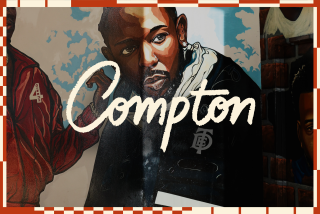Origin story ‘Straight Outta Compton’ is N.W.A’s victory lap, reviews say
When N.W.A burst out of Compton in the late 1980s, the hip-hop group’s powerful music and political message resonated with young fans around the world. The new movie about N.W.A, “Straight Outta Compton,” which opened to strong box office ($5 million on Thursday night alone) could have the same impact -- especially with clashes between police and minority communities playing out daily in the news -- according to many critics.
The film overall got excellent reviews from most critics, earning it an 87% certified fresh rating on Rotten Tomatoes, especially for its first half, which tells the story of how N.W.A was formed. Though some felt the film bogged down in the second half, most saw it as a successful (and celebratory) origin tale for the seminal hip-hop group.
SIGN UP for the free Indie Focus movies newsletter >>
Times film critic Kenneth Turan was not as positive as most about the movie, although he noted that “[director F. Gary] Gray sees to it that the film starts out strongly, bringing the kind of energy and anger against authority that lit up N.W.A’s music to what is in truth a surprisingly familiar tale. For it’s ironic that the most effective parts of ‘Straight Outta Compton’ are its most standard.”
Part of the film’s strength is how N.W.A’s music still resonates with current issues, Turan said. “These words and the situations that called them forth do not, unfortunately, come off as quaint reminders of a bygone era,” he wrote. “Rather, given the disturbing headlines from around the country, quite the opposite is true, giving sections of the film an inescapable relevance.”
However, “‘Straight Outta Compton’ ends up juggling more storylines and moods than it can handle.”
“It took 13 years to reach the screen, required the efforts of four credited writers and runs a meandering 2 hours and 22 minutes, so it might be expected that “Straight Outta Compton” is all over the map, and it is,” Turan said.
Joe Morgenstern of the Wall Street Journal agreed that “the film ... runs low on energy toward the end” and “turns ploddingly sentimental in its sudden focus on Eazy-E’s painful decline, and death, from AIDS.”
For Morgenstern, “Straight Outta Compton” is “notable for its omissions along with its strengths.”
“This is history retold from the perspective of triumphant survivors,” he explained. “It’s an origin story, as compelling as any tale of how superheroes got their superpowers.”
And though “no account of this complex chapter in American entertainment can ignore the sordid, often violent disputes and personal rivalries that led to Ice Cube’s defection and eventually tore N.W.A apart,” he said, “Straight Outta Compton” does not address “crucial questions about personal conduct and the content of [N.W.A’s] hip-hop lyrics.”
Manohla Dargis of the New York Times noted that the film “sidesteps the raw, visceral impact of the words and music that distinguished the group, winning it fans and foes alike.”
Though “Straight Outta Compton” “acknowledges the larger agonizing picture,” according to Dargis, it mostly “celebrates a crew of Horatio Algers of another color who become crossover kings turned establishment titans.”
For Scott Foundas of Variety, this celebration is not at all a bad thing.
Foundas wrote that “‘Straight Outta Compton’ is loath to pass rash judgments on its characters, whose motivations Gray and the writers strive to understand even when their actions verge on the monstrous” and “even when Gray puts ‘Compton’ through the somewhat familiar biopic paces, he brings a richness of observation to the table that transcends cliche.”
“‘Compton’ doesn’t make the N.W.A members themselves into paragons of virtue, even as it suggests that much of their swagger and braggadocio were more performance than reality -- as well as necessary defense mechanisms on streets where real gangbangers posed a serious threat and where the police made little distinction between one type of young black man and another,” Foundas explained.
Similarly, John DeFore of the Hollywood Reporter wrote that “while the movie makes sense of the passions behind [the music], it isn’t at all concerned with those who claimed the group’s ... tracks glorified crime. And it cares even less about complaints concerning misogyny in their lyrics.”
But although “Straight Outta Compton” is “a self-portrait that predictably softens the edges of careers that generated even more controversy than we see here ... it does for the most part fulfill its mission, breathing life into the origin story of a group whose influence is still being felt,” he said.
Ann Hornaday of The Washington Post agreed and insisted that “‘Compton’ deserves a much wider reach than the group’s hard-core fans. “Thanks to eerily on-point timing and adroit direction from F. Gary Gray, this classic star-is-born story manages to transcend its own tight focus,” she wrote.
“As enlightening as it is entertaining, as sobering as it is exhilarating, ‘Straight Outta Compton’ reminds viewers not only who N.W.A were and what they meant, but also why they mattered -- and still do,” Hornaday said.
Twitter: @tracycbrown
MORE:
‘Straight Outta Compton’ film about N.W.A echoes the past and present
Suge Knight’s arrest foreshadowed in ‘Straight Outta Compton’ scene
Eazy-E obituary: Rapper who put ‘gangsta-rap’ and Compton on the pop culture map dies of AIDS at 31
FROM THE ARCHIVES: Wary N.W.A critic turned true believer
More to Read
Only good movies
Get the Indie Focus newsletter, Mark Olsen's weekly guide to the world of cinema.
You may occasionally receive promotional content from the Los Angeles Times.











